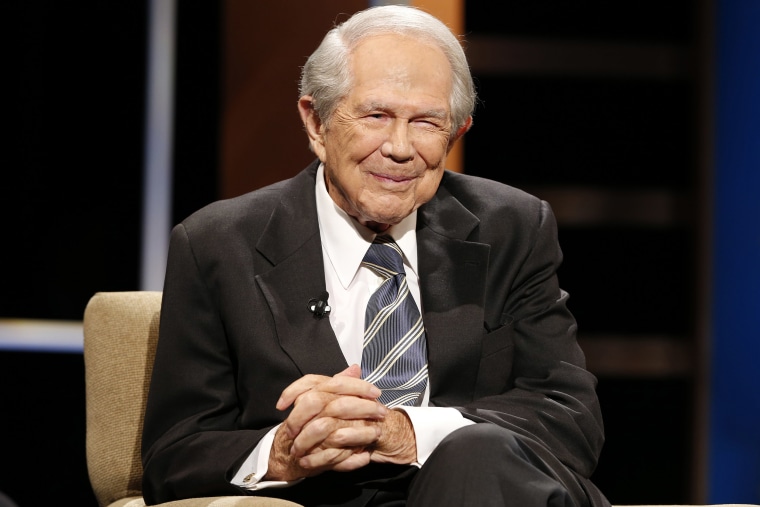Whenever something bad happened, you could count on the doomsayer televangelist, political provocateur and Christian Coalition founder Pat Robertson blaming it on some group he considered hellbound. He blamed “pagans and the abortionists and the feminists and the gays and the lesbians” and “the ACLU” for the 9/11 terrorist attacks. He said women having abortions was the reason Hurricane Katrina hit New Orleans in 2005. Haiti was hit by a devastating earthquake in 2010, Robertson said then, because people there had made “a pact with the devil.”
For the many people hurt by Robertson’s pseudo-prophetic pronouncements, Thursday morning’s news of his death was no reason to mourn.
For the many people hurt by Robertson’s pseudo-prophetic pronouncements, Thursday morning’s news of his death was no reason to mourn. Robertson’s decades of condemning people and claiming their so-called sinfulness caused tragedies, including natural disasters, epidemics and al-Qaeda attacks, is why “Rest in Hell” trended on Twitter. In that, one might even say he reaped what he sowed.
Evangelist Billy Graham courted presidents, but Robertson’s political and religious organizing was, in my view, far more powerful in consolidating the Republican Party and white evangelicals. More than any other religious figure of the 20th century, Robertson’s pursuit of political power in service of biblical prophecy and end time beliefs set the stage for the 21st-century Republican Party and its current morass of religious fervor, morality politics and allegiance to conspiracy beliefs.
Focusing on conservative issues such as family values and abortion, Robertson ran for president in 1988. The first outright charismatic Christian candidate, Robertson finished second in the Iowa and Minnesota caucuses and in the South Dakota primary, but he was unable to make a good showing in subsequent primaries and dropped out of the race.
With that run for president and his media empire, and “700 Club” television show, Robertson provided the template for how politics and conservative Christians, evangelicals, Pentecostals and charismatics alike, would pursue office. With his deft organizing and his usage of end times imagery and conspiracy theories to appeal to his audiences, Robertson influenced the likes of John McCain and Sarah Palin, Donald Trump and, as we see now, Gov Ron DeSantis of Florida.
Trump’s vision of carnage in his inauguration speech, as well as his many pronouncements of doom and gloom, mirror Robertson’s dire predictions for America.
We can also see his influence in the congressional campaigns of politicians such as Rep. Lauren Boebert, R-Colo. and former Rep. Michelle Bachmann, R-Minn. The professed reliance on God, the offensive explanations of natural disasters and the vilification of people deemed immoral are now staples of Republican Party platforms.
Trump’s vision of carnage in his inauguration speech, as well as his many pronouncements of doom and gloom, mirror Robertson’s dire predictions for America. At the same time, the Republican Party capitalizes on morality, fear and divisiveness, to gain voters and contributions.
Make no mistake. Pat Robertson pimped his piety to millions, but he also coveted money and political power.
Robertson’s story is not one of poverty. Born into a family with political connections and power, he was the son of Sen. Absalom Willis Robertson of Virginia. Pat Robertson earned a law degree from Yale in 1955 and a master of divinity degree from New York Theological Seminary in 1959.
After a brief stint in ministry, he bought a UHF station in 1961, which became the Christian Broadcasting Network, and through the growth of the station and its religious programming, including the 700 Club, Robertson would go on to become a rich and powerful televangelist who would inspire others, such as Jim and Tammy Faye Bakker, and other Christian networks like Trinity Broadcasting Network and the Bakker’s PTL network. He would also form in 1977 Regent University, whose graduates include Jay Sekulow, a Trump Lawyer, and political partner of Robertson.
Robertson died during the first full week of Pride Month, when the LGBTQ people he routinely damned refuse to accept the shame he tried to heap upon them.
His organizations, the Christian Coalition and the American Center for Law and Justice, laid the groundwork for the kind of evangelical political action that began during the 1990s and has lasted into the 21st century. The Christian Coalition’s organizing in churches, with its voters’ guide and commercials, pushed votes and support to the Republican Party.
Christian political action organizations such as Turning Point USA the legacy of Pat Robertson’s vast empire of organizing by manipulating people’s fear and their faith.
Robertson died during the first full week of Pride Month, when the LGBTQ people he routinely damned refuse to accept the shame he tried to heap upon them. It is not the exit he would have wanted, but it is the one he deserves. After all, his ability to pronounce doom, gloom and death upon others was the foundation of his ministry and his fortune. The timing of his death gave a little something back to some of the communities he excoriated for religious and political power.
